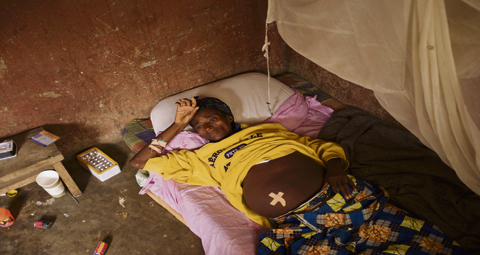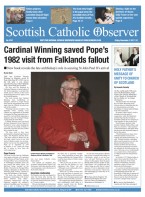February 20 | ![]() 0 COMMENTS
0 COMMENTS ![]() print
print

Helping the helpless back from the brink
In the second of a series of special reports throughout Lent, IAN DUNN reports back from DR Congo and Rwanda where SCIAF is working with victims of harrowing sexual violence. 2015 marks the 50th anniversary of the foundation of The Scottish Catholic International Aid Fund
Chukuru Nacinyungu is 12 years old. She doesn’t talk much. She lives in a small village in the Eastern DR Congo. The land here is rich, the plant and crops are a luscious green and beneath the soil there is vast mineral wealth. The hills roll down to the beautiful Lake Kivu, and, in another world, this would have been idyllic spot to spend a childhood.
In this area 20 years of ethnic conflict, spurred by grasping hunger for the region’s resources, has left a country and a people with scars that cannot be hidden.
Two years ago Chukuru was out collecting firewood.
“A man found me and took me by force,” she said. “When they found me I couldn’t say anything.”
The rape was so brutal that two years later she still has health problems.
The culprit—who was well known in the local community—was arrested after Chukuru was taken to hospital. However, the justice system here is so broken down that he was let go after paying the local police a small fine, seen as more of a bribe. In a rage over being arrested at all, he then went to Chukuru’s house and viciously beat up her father before fleeing into the jungle.
“I am still frightened,” she told me. “He could come back. Even doing normal activities, I sometimes remember the violence.”
Despite the trauma she endured, Chukuru has returned to school.
“My purpose is to study,” she said. “The school teaches me to read and to write, the reading is most important, that is my favourite.”
Weapon of war
The full horror of Chukuru’s story is heightened by the knowledge that what happened to her is not rare.
In the mid-1990s Rwandan troops entered South Kivu, in pursuit of the perpetrators of the 1994 genocide. Since then the region has been racked with conflict, with a dizzying number of different armed groups fighting and allying with each other at different points. All sides used rape as a weapon of war and one report suggested that 400,000 people were raped in a single year. The worst of the fighting has ceased in the past couple of years, but this remains a place were thousands upon thousands of women were routinely raped.
There are countless men here, themselves often brutalised through being press ganged into armed groups as children, who have committed countless acts of rape. How do you rebuild a society that has been traumatised by such horror?
For some women the trauma goes on long after the attack.
Azama Wasangwa is 43 and has four children, and ten years ago a rebel group came into her village and dragged her away into the bush. She was raped by the rebel commander who then gave her to his men who pumped litres of water into her stomach. Though she survived, a month later Congolese soldiers captured her and also raped her. When we met her she had just been released from hospital but was determined to tell her story.
Lying on the ground in a small hut, she told us that when the pain was bad it was as ‘if there is a plastic bag full of dirty water in my belly.’
“We need peace here,” she told me. “War has brought so much suffering.”
Support
Azama is part of a group of women supported by SCIAF’s partner the Bukavu Diocesan Justice and Peace Commission. Alongside SCIAF’s work in the Congo helping women farmers, which is supported by this year’s Wee Box campaign, such projects are allowing people come back from the brink.
“We could sit with one other after all that had happened,” Azama said. “After everything that happened, we learned that we are human. The group helps us to manage our money and that we’re not alone. We don’t need much help, just a little and to be able to live peacefully.”
A key part of SCIAF’s work in the Eastern Congo is helping victims of sexual violence rebuild their lives. They receive counselling, medical help, and financial advice to help them carry on. SCIAF is, however, also helping Congolese people who are trying to change their country fundamentally, to stop it being a nation were rapists can freely walk the streets.
SCIAF’s specialist partner AJV (Association d’Appui Juridique aux Victimes de Viol et des Violences) is working to bring some of the thousands of rapists in the Eastern Congo to justice.
Lawyer Juvenal Bizimana looks out of place in the bush with his sharp suit and pocket square, yet he and lawyers like him are heroes of their profession. Every day he goes to work to help the victims of sexual violence.
“In the villages the percentage of women affected is higher than the towns,” he said. “I can’t say for certain but it might be around 80 per cent. The worst case I heard of involved a seven-year-old girl who was raped by seven men from a rebel group.”
He himself has faced violence many times following threats for attempting to bring charges against violent dangerous men. Other members of AJV have had to go into hiding or flee the region due to the severity of the threats against them.
Juvenal himself has though about leaving many times.
“But if I left, how do things get better?” he said. “I am humanitarian. That is what pushes me. I believe things can improve.”
A better future
Agonisingly slowly, things are improving the Eastern DR Congo. After years of conflict there is now a fragile peace. Where once there was no consequences for rapists, now AJV and other groups have hundreds men facing charges of sexual violence. Not everyone is convicted but, slowly, the culture is changing.
Halfway way across the world, Scottish aid through SCIAF is helping rebuild a country that had been all but destroyed by rape and violence.
There is unbelievable evil in the Congo, men who have done Godless, shameful things, but there are also shining lights—men and women with endless compassion and great courage who are taking their country back.
Nothing can ever erase what happened to Chukuru Nacinyungu—who is 12 years old, who doesn’t say much—and those like her. But she can have the chance to live the rest of her life. And the man who raped her may now face the consequences of what he has done.
That is the work of the Lord.
—2015 marks the 50th anniversary of the foundation of the The Scottish Catholic International Aid Fund. The SCO is a media partner in this SCIAF’s Wee Box, Big Change campaign this year. All donations to the campaign before May 17 will be matched pound for pound by the UK Government.
— Pic: Simon Murphy











